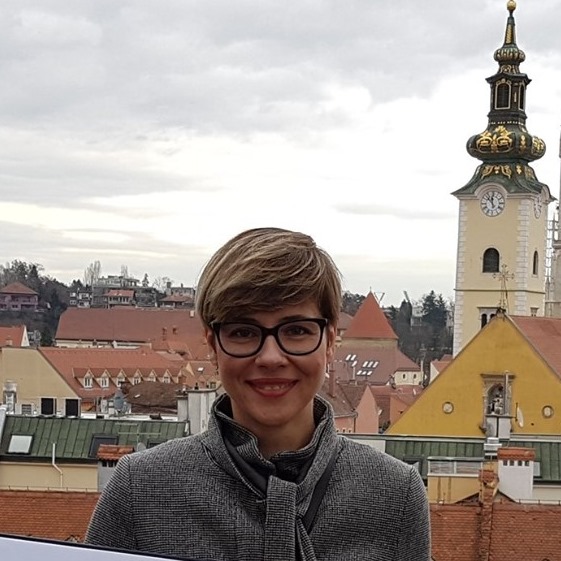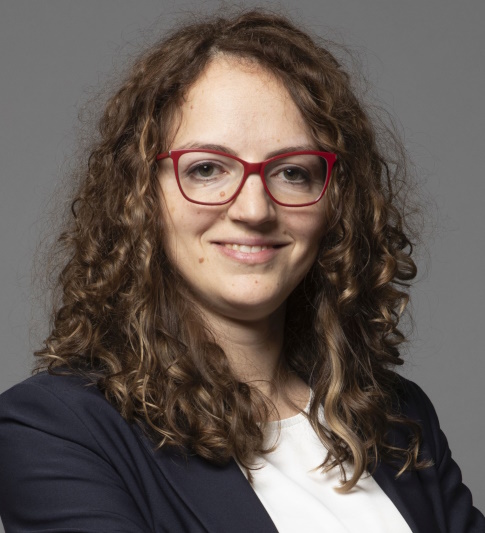WIE (Women in Engineering) Affinity Group
Obavijesti
Interesna skupina Žene u inženjerstvu Hrvatske sekcije IEEE poziva vas na predavanje
"Završetak projekta Caliper: istraživanje i inovacije za ravnopravnost spolova"
koje će održati izv. prof. dr. sc. Anamari Nakić u srijedu, 13. prosinca 2023. godine, u 19.00 sati na FER-u u dvorani D102. Očekivano trajanje predavanja s raspravom je 60 minuta. Predavanje se održava na hrvatskom jeziku i otvoreno je za sve zainteresirane, a posebno se pozivaju studenti. Sažetak predavanja nalazi se u nastavku obavijesti.
U novom dvostrukom izdanju podcasta interesne skupine Women in Engineering hrvatske IEEE sekcije udružili smo snage s IEEE Power&Energy Society Women in Power Croatia. Docentica Mirna Gržanić s Zavoda za visoki napon i energetiku razgovarala je s četiri fantastične žene koje povezuje ljubav i strast prema energetici. Sara Raos i Nina Stipetić s Fakulteta elektrotehnike i računarstva otkrile su nam zbog čega je znanstveni i nastavni rad u području energetike atraktivan, dok su Zora Luburić i Štefica Vlahović iznijele svoja iskustva rada u industriji nakon doktorata iz područja energetike na FER-u. Pogledajte najavu novih epizoda ŽensCast-a i inspirirajte se zanimljivim životnim pričama naših gošći, bivših studentica FER-a.
Poveznice na epizode: ŽensCast#8 i ŽensCast#9
Interesna skupina Žene u inženjerstvu Hrvatske sekcije IEEE poziva vas na predavanje
"Rodno osjetljivo poučavanje u STEM-u"
koje će održati izv. prof. dr. sc. Pina Milišić u srijedu, 6. prosinca 2023. godine, u 19.00 sati na FER-u u dvorani D102. Očekivano trajanje predavanja s raspravom je 60 minuta. Predavanje se održava na hrvatskom jeziku i otvoreno je za sve zainteresirane, a posebno se pozivaju studenti. Sažetak predavanja nalazi se u nastavku obavijesti.
Povodom Međunarodnog dana žena i djevojaka u znanosti, u sedmom izdanju ŽensCast-a, podcasta interesne skupine Women in Engineering Hrvatske IEEE sekcije ugostili smo Antonellu Barišić, istraživačicu i doktorsku studenticu na FER-u.
U razgovoru s Antonellom dotakli smo se mnogih tema: od studiranja na FER-u, rada u studentskim udrugama i zaposlenja u LARICS laboratoriju do sudjelovanja na NATO projektu MARCUS. Antonella nam je približila život u Albuquerqueu, New Mexico, usporedila svoja američka iskustva s radom u Hrvatskoj i objasnila zašto smatra da je za nju FER najbolji odabir studija. U novoj epizodi ŽensCasta doznat ćete kako najlakše prebroditi motivacijske krize koje se ponekad znaju javiti tijekom studiranja i rada na izazovnim projektima.
Šesto izdanje ŽensCast-a, podcasta interesne skupine Women in Engineering Hrvatske IEEE sekcije bavi se predrasudama i stereotipima vezanim uz spol. Gošće Ivana Osredek, studentica diplomskog studija bioinformatike na Sveučilištu u Leuvenu, Belgija i Iva Marketanović, studentica diplomskog studija psihologije na Hrvatskim studijima Sveučilišta u Zagrebu, predstavile su ideju i rezultate projekta The Science of Bias (SOB) koji se provodi u sklopu Društva za edukaciju van okvira (EVO).
Ako vas zanima kako hrvatski srednjoškolci i studenti doživljavaju “Ivanu” odnosno “Ivana”, koje osobine smatraju poželjnima za muškarca a koje za ženu, te koje su razlike u rezultatima ankete obzirom na američku studiju, pogledajte novu epizodu ŽensCasta i poslušajte naše zanimljive sugovornice. Najavu ŽensCasta#6 možete vidjeti na sljedećoj poveznici, a cijeli epizodu ovdje. Više o Science of Bias pročitajte u nastavku obavijesti.
Povodom Međunarodnog dana žena, 8. ožujka, održan je "Globalni maraton: 25 godina WiE". Događaj je bio posvećen svim ženama na svijetu koje su suočene s diskriminacijom, nepravdom i socijalno-ekonomskim problemima. Cilj ovog maratona je susret, razmjena ideja, razvijanje kreativnosti i suradnja WiE zajednice širom svijeta kako bismo pokazali da je naša raznolikost ujedno i naša snaga.
Aktivnosti interesne skupine Hrvatske IEEE sekcije Women in Engineering predstavljene su na Maratonu u okviru predavanja dr.sc. Marie Alexandre Paun, predsjednice Odbora WiE regije R8, pod naslovom "Istaknuti događaji i videozapisi interesnih skupina WiE regije R8". Naše aktivnosti predstavljene su zajedno sa aktivnostima WiE Rumunjske, WiE Velike Britanije i Irske, te WiE Portugala.
Materinski jezik predstavlja jedan od najvažnijih simbola kulturnog identiteta osoba i naroda. Hrvatski jezik danas je međunarodno priznat jezik pod svojim nacionalnim imenom, a u Europskoj Uniji uveden je kao 24. službeni jezik.
Povodom Međunarodnog dana žena i djevojaka u znanosti, 11. veljače 2022. u petom izdanju ŽensCasta razgovarali smo sa profesoricom emeritom Brankom Zovko Cihlar. Profesorica Zovko Cihlar doktorirala je na Elektrotehničkom fakultetu Sveučilišta u Zagrebu 1964. godine čime je postala prva žena doktorica elektrotehnike u Hrvatskoj.
ŽensCast je podcast IEEE interesne skupine Women in Engineering Croatia (WiE Croatia) koji se provodi u suradnji s FER-om i projektom Caliper. ŽensCast#5 premijerno je prikazan 11. veljače 2022. povodom Međunarodnog dana žena i djevojaka u znanosti. ŽensCast#5 pogledajte ovdje.
U stalni postav Tehničkog muzeja Nikola Tesla u Zagrebu interpolirana je izložba
"Žene i tehnika - izložba rodno inkluzivne tematike"
Izložba ostaje otvorena do 15. ožujka 2022.
Svoj doprinos izložbi dao je i FER, odnosno Središnja knjižnica FER-a kao i vodstvo IEEE interesne skupine WiE Croatia ostvarivši na taj način uspješnu suradnju sa Tehničkim muzejem Nikola Tesla.
Povodom Dana otvorenih prozora FER-a, 26. studenog 2021. premijerno je prikazana nova epizoda ŽensCasta, podcasta IEEE interesne skupine Women in Engineering Croatia (WiE Croatia). U novom ŽensCastu razgovarali smo sa mladom i uspješnom FER-ovkom, inženjerkom računarstva, poduzetnicom i aktivisticom Kajom Pavlinić.
ŽensCast#4 pod nazivom “Sve pet!” pogledajte ovdje.
Odjel za menadžment u tehnologiji i inženjerstvu i Interesna skupina Žene u inženjerstvu Hrvatske sekcije IEEE pozivaju vas na predavanje
"Plan ravnopravnosti spolova Fakulteta elektrotehnike i računarstva"
koje će održati izv. prof. dr. sc. Anamari Nakić u petak, 19. studenog 2021. godine, u 13.00 sati putem platforme Zoom. Očekivano trajanje predavanja s raspravom je 60 minuta. Predavanje se održava na hrvatskom jeziku i otvoreno je za sve zainteresirane, a posebno se pozivaju studenti. Životopis predavačice i sažetak predavanja nalaze se u nastavku obavijesti.
Poveznica na Zoom pristup:
Predsjednica interesne skupine Žene u inženjerstvu IEEE, izv. prof. dr. sc. Pina Milišić s FER-a razgovarala je s novinarkom portala Žene i mediji. U razgovoru se osvrnula na misiju, aktivnosti i planove naše interesne skupine. Intervju možete pronaći ovdje.
Novi ŽensCast je objavljen - Znanstvena spajalica.
U novom izdanju podcasta IEEE interesne skupine Women in Engineering Croatia nastavljamo sa predstavljanjem uspješnih FERovki. Naša gošća je inženjerka Una Pale, doktorandica na EPFL-u. Una se bavi obradom signala i strojnim učenjem sa primjenama u biomedicinskim istraživanjima. Nakon diplome 2016. godine, na FER-u je provela dvije godine radeći na zanimljivim problemima poput razvoja elektromiografskog biofeedback sustava MyMyo, podrške neurofeedback terapiji, implementacije tehnika disanja Nadi shodhana te proučavanja njihovog utjecaja na autonomni živčani sustav. Od 2018. godine zaposlena je na EPFL-u, u Laboratoriju ugrađenih sustava (Laboratoire des Systèmes Embarqués). U okviru svoje doktorske disertacije nastavlja se baviti primjenama strojnog učenja u biomedicinskom području te razvija nove algoritme za primjenu u aplikacijama namijenjen-ima nosivim uređajima. Una je svestrana, završila je srednju muzičku školu, svira tri instrumenta (harfu, klarinet i klavir). Vrlo je aktivna u udruzi Penkala koja okuplja i spaja mlade hrvatske istraživače iz industrije i akademije, te potiče prenošenje znanja i iskustva među mladim genera-cijama.
Sa Unom smo razgovarali o svemu pomalo: o tome kako je u djetinjstvu razvila interes za prirodne znanosti; zašto se odlučila studirati baš na FER-u; kakva znanja i koje vještine je stekla na FER-u; kako se snašla u novoj sredini na EPFL-u te čime se bavi u okviru izrade doktorata. Pogledate li novu epizodu ŽensCasta do kraja, doznat ćete što je to znanstvena spajalica i kakve ona ima veze s našom Unom.
Europska unija se suočava s problemom podzastupljenosti žena na radnim mjestima i u obrazovnim programima u područjima STEM-a, unatoč tome što žene čine 52 posto europskog stanovništva i 57,7 posto osoba sa završenim visokim obrazovanjem u Europskoj uniji, naglasili su europarlamentarci u raspravi o promicanju ravnopravnosti spolova u obrazovanju i karijerama održanoj 9. lipnja 2021. u Europskom parlamentu.
Nakon održane rasprave, zastupnici su 10. lipnja 2021. godine usvojili rezoluciju kojom pozivaju države članice da promicanje ravnopravnosti spolova u područjima STEM-a uključe u svoje akcijske planove i strategije u vidu pružanja odgovarajućih poticaja. Spomenuta rezolucija usvojena je s 546 glasova “za”, 35 “protiv” te 100 suzdržanih. Predložene su i konkretne mjere kojima će se promovirati sudjelovanje žena i djevojaka u sektorima prirodoslovlja, tehnologije, inženjerstva i matematike.
Za više detalja kliknite na link Ravnopravnost@fer.hr
U okviru projekta Umreženi stacionarni baterijski spremnici energije – USBSE u petak 28. svibnja 2021. u 11.00 sati održat će se radionica pod nazivom “Žene u znanosti” kojoj je za cilj promoviranje horizontalnih načela EU s naglaskom na ravnopravnost spolova. Radionica je besplatna i otvorena za sve zainteresirane. WiE Hrvatska je jedan od suorganizatora ovog događanja, a na radionici ćemo predstaviti naše djelovanje i suradnju s H2020 projektom Caliper.
Na radionici možete sudjelovati preko sljedeće poveznice:
Novi ŽensCast je objavljen - Radim po svom.
Jeste li se ikad zapitali što neke ljude čini iskreno ispunjenima, kreativno, poslovno i privatno, te kako to isto kreirati za sebe?
Kako ostvariti svoje potencijale? Voli li većina ljudi unaprijed određene poslovne uloge? Kako ne završiti na poslovima koje ne volimo? Kako originalnoj poslovnoj ideji dati “glavu i rep” te kako svoju tvrtku postaviti “na noge”? Kako poticati žene u poduzetništvu? Kako balansirati privatni i poslovni život ako ne radiš “od devet do pet”? Kako se uspješno prezentirati na društvenim mrežama, te pritom sačuvati privatnost? Na koji način inženjersko obrazovanje stečeno na FER-u može služiti u nošenju sa svakodnevnim poslovnim izazovima u online svijetu?
O tim pitanjima i o mnogim drugim temama razgovarali smo sa Teom Zavacki u drugom izdanju ŽensCasta, podcasta interesne skupine IEEE Women in Engineering (WiE Croatia). Jedan od osnovnih ciljeva ŽensCasta je senzibilizirati studentsku populaciju tehničkih i prirodoslovnih fakulteta za društvene teme te poticati otvoreni dijalog o stereotipima s ciljem osvještavanja vlastitih stavova i mišljenja.
Tea Zavacki je poduzetnica, poslovna trenerica, inženjerka, FER-ovka, edukatorica zainteresirana za pomaganje drugima kreirajući alate koji korisnicima pomažu u ostvarivanju pozitivnih i održivih promjena. Tea sa posebnom strašću i entuzijazmom pomaže mladima u realizaciji njihovih poduzetničkih ideja. Svojim radom Tea dokazuje da ne morate ostati u kutiji koja vam je dodijeljena diplomom, već da današnji poslovni svijet u online obliku nudi bezbroj mogućnosti. Više o Tei možete doznati na teatime.com.hr
... održano je 7. prosinca putem MSTeams platforme. Predstavljene su aktivnosti održane u 2020. godini. Raspravljalo se i o planovima za iduću godinu koji bi doprinijeli jasnijoj prepoznatljivosti Udruge kako na FER-u tako i na cijelom Sveučilištu.
ŽensCast je nastao u okviru hrvatske sekcije IEEE Women in Engineering kao pokušaj prilagodbe “novom normalnom”, odnosno “online” situaciji nastaloj radi pandemije Covida. Nadamo se da ćemo emitiranjem podcasta doprijeti do šire publike nego putem standardnih predavanja “uživo” koja su se održavala u prostorijama Fakulteta. Jedan od glavnih ciljeva djelovanja sekcije WiE-Hrvatska je potaknuti žene da svoje interese pronađu u nekom od STEM područja predstavljajući im ženske uzore. Pomoću ovog podcasta željeli bismo puno više od toga:
- zanimaju nas mogućnosti primjene STEM vještina u svrhu rješavanja problema zajednice,
- željeli bismo senzibilizirati studente tehničkih i prirodoslovnih fakukteta za društvene teme,
- voljeli bismo osvijestiti neke predrasude koje danas postoje u javnom prostoru,
- rado bismo otvoreno razgovarali o stereotipima, s ciljem osvještavanja vlastitih stavova I razmišljanja
- zanimaju nas procesi promjene, kako osobne tako i institucionalne
ŽensCast #1 održan je u sklopu Dana otvorenih prozora FER-a, 20.11.2020. , gošća je bila doc.dr.sc. Lana Horvat Dmitrović s kojom smo razgovarali o matematici na prvoj godini FER-a, mindfulnessu i ženskoj energiji na FER-u. Snimku razgovora možete pogledati na sljedećoj poveznici.
Odjel za menadžment u inženjerstvu i Interesna skupina Women in Engineering Hrvatske sekcije IEEE pozivaju Vas na predavanje:
Izazovi menadžmenta u medijskoj industriji
koje će održati Marija Slijepčević, univ. spec. oec., pomoćnica dekana na visokom učilištu VERN'
u četvrtak, 16. ožujka 2017. godine u Sivoj vijećnici FER-a u 15.00 h.
Više o predavanju i predavačici pročitajte u nastavku obavijesti.
U organizaciji Netokracije se u Zagrebu 3. ožujka 2017. u prostoru HUB385 ponovno održava konferencija:
"Ladies of New Business"
gdje možete poslušati inspirativne priče, iskustva, savjete i raspravu o ženama u poslovnom svijetu te stvoriti nova poznanstva, možda i u obliku mentorstva koje se nudi kroz program Digitalnih karanfila.
Muški sudionici su također dobrodošli :)
Opširnije o konferenciji na službenim stranicama.
Glavna tema ovoga izdanja je:
"Kako biti ‘digitalni’ roditelj i developerica u svijetu developera?".
Za događaj je potrebno prijaviti se zbog ograničenog broja mjesta.
Program počinje od 17 sati.
Nakon konferencijskog dijela, slijedi mentorski dio programa Digitalni karanfili.
U organizaciji Netokracije po drugi puta se u Zagrebu 22. studenog 2016. u prostoru HUB385 održava konferencija:
"Ladies of New Business"
gdje možete poslušati inspirativne priče, iskustva, savjete i raspravu o ženama u poslovnom svijetu te stvoriti nova poznanstva, možda i u obliku mentorstva koje se nudi kroz program Digitalnih karanfila.
Muški sudionici su također dobrodošli :)
Opširnije o konferenciji na službenim stranicama.
Za događaj je potrebno prijaviti se zbog ograničenog broja mjesta.
Program počinje od 17 sati.
Nakon konferencijskog dijela, slijedi mentorski dio programa Digitalni karanfili.
Konzultantska firma A.T. Kearney uputila je WiE članicama poziv na druženje i networking događaj:
"Pitch perfectly with A.T. Kearney"
koji će se održati 9. prosinca 2016. u Ljubljani.
Više detalja u nastavku obavijesti.




